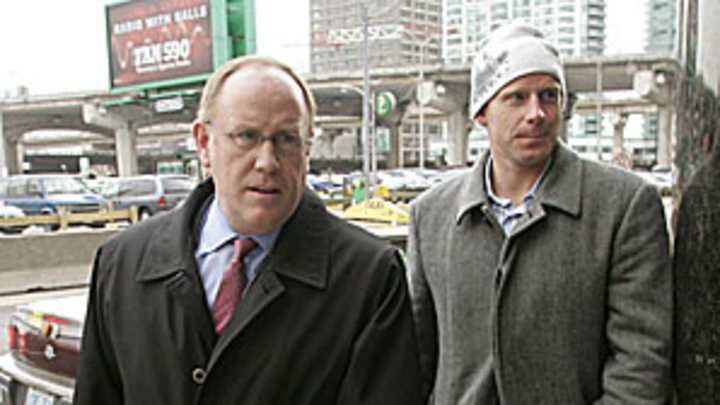Vindication for Bob Goodenow?

He could have helped himself to a heaping helping of schadenfreude if he'd been inclined.
But despite being reached by SI.com over the weekend, the former NHL Players Association director declined to comment on the increasingly polarized talks between the league and Goodenow's third successor, Donald Fehr. Since resigning his post in 2005. Goodenow, in fact, has yet to give an on-the-record interview about the events that led to his departure seven years ago.
However, sources close to Goodenow paint the following picture of him these days: He's been "sitting at the end of the dock at his Northern Michigan home, relaxing with a fishing pole in hand."
Those same sources say that, while Goodenow doesn't want to interfere with the NHLPA's business or serve as a distraction to its negotiations, he does permit the more-than-occasional "Told you so" thought to cross his mind.
DATER:Lockout timeline -- 2004-05 vs. now
No word aside from "rout" need apply to describe the last NHL collective bargaining talks, the ones between Goodenow and NHL Commissioner Gary Bettman. After vowing that his players would never accept a salary cap and warning them the lockout that started in 2004 could last as long as 18 to 24 months, his union's resolve crumbled and a cap-based system that included severe salary rollbacks was implemented.
Goodenow, whose tenure saw the average NHL salary rise from about $276,000 to $1.8 million by 2003-04, told his players to be steadfast against a cap because once a cap is in place, team owners will forever try to make it lower.
With the current CBA set to expire on Sept. 15, Goodenow was right on that prediction.the owners' initial proposal to players included a reduction in the percentage of hockey revenues they receive from 57 to 46 percent -- 43 according to the NHLPA's interpretations of hockey-related revenue accounting methods.
During the tumult and shouting of the 2004-05 lockout, Goodenow and the NHLPA scoffed at the NHL's claim that ticket pricing might be lowered if there were a CBA with friendlier terms for the owners. While, in fact, ticket prices on average did not rise substantially in the 2005-06 season and in some cases were lowered, the average did increase fairly substantially in the longer term.
According to Team Marketing Report, a Chicago-based firm that analyzes the business aspects of sports, average NHL ticket prices have increased from $43.13 in 2005-06 to $57.10 in 2011-12. It is hard to point accusatory fingers at NHL owners for asking for more money for tickets when the laws of supply and demand clearly have been met in their favor. NHL arenas were filled to about 93 percent capacity last season.
What is most galling to some longtime NHLPA figures, sources said, is how small-market teams have jacked up prices for games when big-market or Original Six clubs visit their arenas.
Take the Florida Panthers, for instance. Tickets for the 2012-13 season are on sale now, and here are some prices that illustrate the glaring difference between opponents: the Panthers' Oct. 18 home-opener against the New York Islanders has ticket prices (including fees) listed on the team website ranging from $16.50 (terrace level) to $163.75 (front row, lower bowl). For the New York Rangers' visit to Bank Atlantic Center on Nov. 21, however, the prices for the same seats range from $28.50 to $317.50. For a Nov. 23 game against Detroit, you'll have to cough up $31.75 to $368.75 for a seat.
The St. Louis Blues' Oct. 20 home game against Minnesota has prices ranging from $30 to $305. A Dec. 29 home date against Philadelphia goes for $61.55 to $376.60, and so on.
The defending Stanley Cup champion Los Angeles Kings have not set prices for single-game tickets yet, but their website is very clear: "All LA Kings tickets are priced based on demand, opponent, day of week and number of days before the game. Prices may vary from week to week and will go up or down each Wednesday based on these and other factors. All sales are final."
It is galling to NHLPA types that big-market teams essentially try to ask for more money from small-market fans, but are stingy when it comes to the concept of revenue sharing. Hence, labor problems such as the kind that are developing now between owners and players -- again.
And, hence why people like Bob Goodenow may be excused for thinking, "Told you so."
